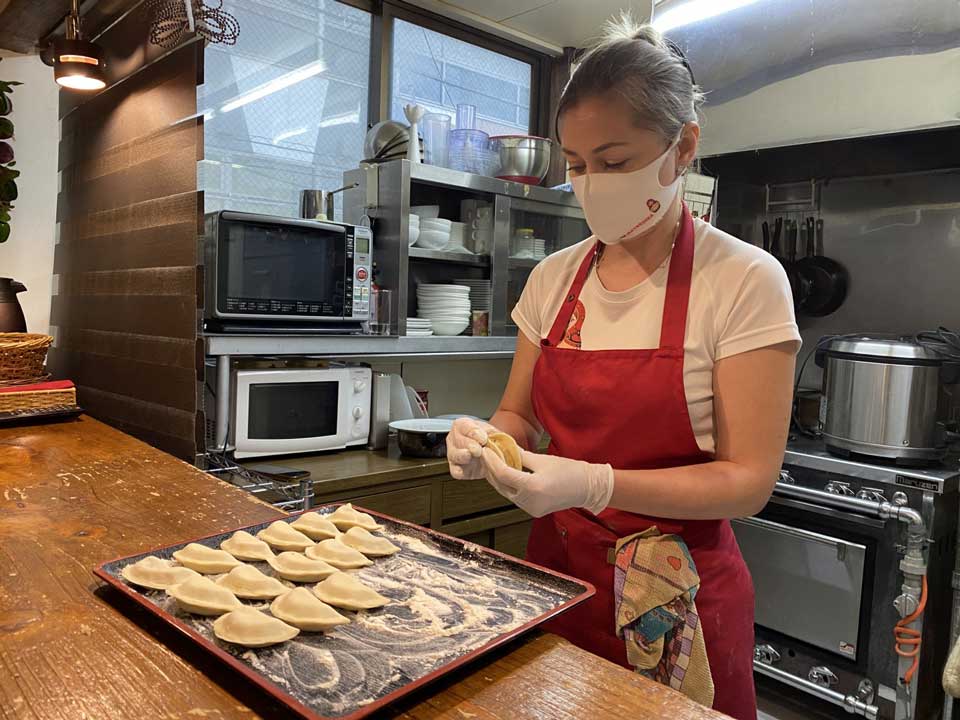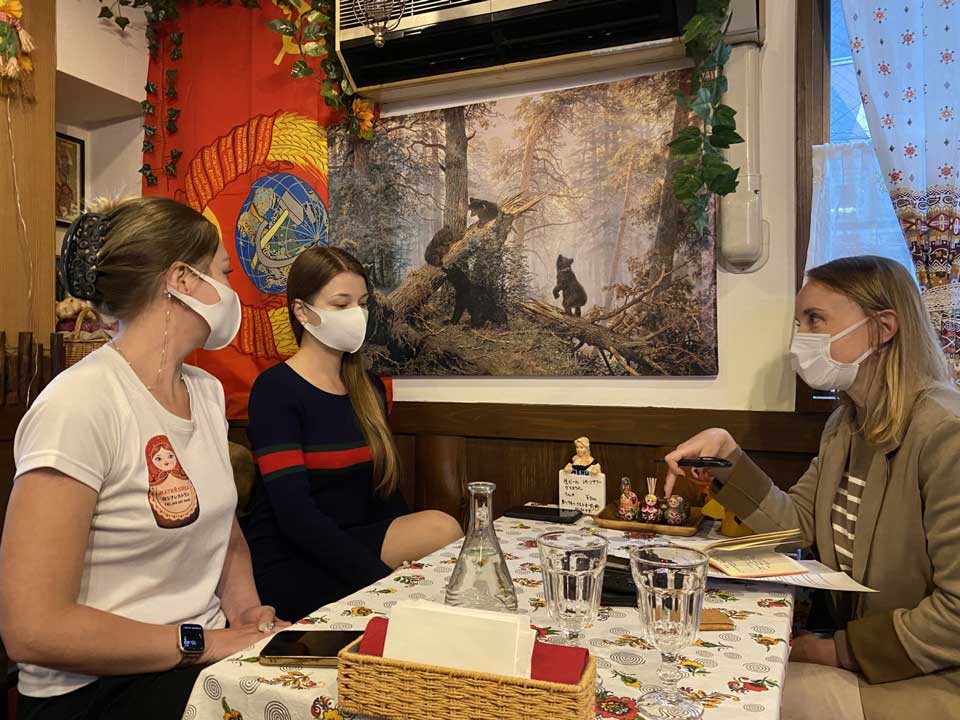"As long as there is some way we can help, we'll help."
The Stetsyuks moved to Japan from Khabarovsk, in Russia's Far East, in the early 2000s. About five years ago, Anastasia opened Matryoshka in Chiba City. The restaurant serves both Russian and Ukrainian dishes.
Last year, when Russia invaded Ukraine, the mother and daughter reacted with shock and confusion. They resolved to help Ukrainian evacuees in any way they could.
"We wondered why the lives of innocent people have to be put at risk," says Anastasia. "Why do they have to face the possibility of death? As long as there is some way we can help, we'll help. As long as it's in our power to help, we will."

Anastasia has roots in both countries, having a Ukrainian grandfather. Her dual roots are reflected in the two large flags — one from each nation – that adorn the entrance of Matryoshka. The restaurant also features traditional fabric tablecloths, bear figurines, painted wooden utensils, and of course, matryoshka nesting dolls.

"February 24...I couldn't even believe it. I couldn't believe that our side was on the attack and, what was worse, attacking our relatives," says Anastasia. "I have Ukrainian blood; I have relatives and acquaintances there. For three or four days we were just...in shock. You turn on the TV and see it unfolding...it was very scary."
Kindness knows no borders
Japan started taking in evacuees from Ukraine in April last year. More than 2,000 people have since made the move. Most are women and children. Some chose their destination because they had relatives or friends in Japan, and many are studying Japanese. There were some who faced particular difficulty because they had no local ties.
Anastasia and Dayana were inundated with inquiries from Ukrainian friends and acquaintances. And when evacuees began to arrive, they realized that they had to do something to help. Anastasia says it's irrelevant which side of a conflict your home country is on. The important thing is to help those in need.

Dayana came up with the idea of connecting with those in need through social media. Over time, more people learned about the aid the restaurateurs were offering.
"We started with just giving advice about various things and providing food. We wanted to offer as much help as we could, even with things that might seem simple to those familiar with life in Japan," Anastasia explains. "We joined people on hospital visits to translate and helped them with shopping, things like that."
Some evacuees have even worked part time at Matryoshka, helping with time-consuming tasks such as preparing dumplings.

"When a person comes from such a terrible place and has no one to turn to, they experience even more stress," she says. "Going out and carrying out tasks, however small, takes a person out of himself and reduces the stress a little. Through the process of communicating, people become acquainted, develop friendships. That makes it is easier to get through these terrible times."
Added assistance from corporate Japan
Over the course of a few months, several dozen evacuees from Ukraine turned to Matryoshka for help.

Eventually, a Japanese apparel chain offered extra help. The Matryoshka team had been delivering meals to one of the company's offices, and when staff learned about Anastasia and Dayana's support for Ukrainians in Japan, they began donating new clothes for the evacuees. The pair distributed clothes to those who needed them.

One woman sought help with childcare. Having no friends or relatives in Japan, she had no one to leave her child with, which hindered her ability to find a job. Anastasia was able to offer advice about how to find and apply for places at local kindergartens.
Japanese people who speak Russian and Ukrainian began coming to Matryoshka to offer translation services, and the local immigration office pitched in by simplifying bureaucratic procedures.
Becoming scapegoats
Immediately after the start of Russia's invasion of Ukraine, Anastasia and Dayana faced harsh words from some who were outraged by Moscow's aggression.
"People wrote things like 'Get out' and 'Leave' on our Instagram," Anastasia says. "They called, they came to the restaurant and said things like 'You are bad' and asked why we're doing all this."
There has been criticism from both Russians and Ukrainians. Some rebuked the pair for being from the aggressor nation, while others called them out for helping Ukrainians.
Anastasia says this won't stop them from coming to the aid of those who need help. "I never doubted that offering help was the right thing to do. No matter what they say — whether they complain about Russians helping Ukrainians or Ukrainians helping Russians, the important thing is that everyone is the same, everyone feels the same pain when they are suffering. I will help as much as I can and I'll be glad to do it."
Stronger together
Anastasia recalls the devastating earthquake that struck northeastern Japan in 2011. She witnessed how unity and cooperation can help people overcome the challenges they face and move forward.
"Everyone teamed up to help each other — with water, food, and housing. They immediately began to build temporary homes. This just shows how quickly assistance can come if people are united and help each other generously," she says. "If you just turn a blind eye, things will only get worse. No one will feel better. If a person is isolated, it's not good."

Now, almost a year after Russia launched its invasion, Anastasia and Dayana are unsure how the situation will affect their restaurant business. But they feel supported for their efforts from regular customers who understand their aims.
"I was approached by a Russian-speaking Japanese woman who used to live in Moscow," Anastasia says. "She told me that hard times can come to anyone, anywhere, at any time, and urged me to hang on and keep the restaurant open, saying that she would always be a customer. People tell us they are with us, that we are all the same, and we will get through this together."
This kind of encouragement bolsters Anastasia and Dayana's determination to go on providing help to those in need. Against a backdrop of unfolding tragedy, they remain steadfast in their conviction that kindness and optimism will win in the end.

